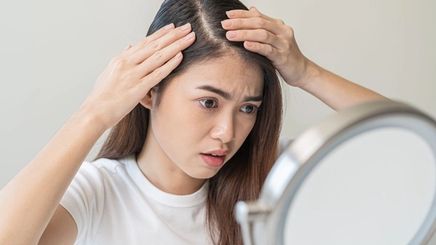
What is sebum? You may have heard the word tossed around in conversations about sweaty, greasy, or oily hair. Perhaps you encountered the term in your quest for the holy grail beauty product that could combat your excessively slick skin.
Sebum is a waxy substance produced by your sebaceous glands. While sebum gives your face a sheen that, by current standards, isn't appealing, you shouldn't get rid of all of it. It protects your skin and keeps it moisturized. It's the source of your and shields the scalp from the elements.
What is Sebum And What Causes It?
Fat molecules, wax, and squalene comprise the body's natural oil. Sebum moisturizes your skin – including your scalp – protecting it from breakage and potential infection.
When sebum is just the right amount, it primarily prevents your hair from becoming . Unfortunately, too much of it can make your hair (and skin) greasy. Some people have more active sebaceous glands, making them more prone to seborrheic dermatitis and . Hormonal changes, such as puberty or pregnancy, can influence your sebum production.
Certain lifestyle habits also play a role in how sebum affects your hair. Not bathing regularly can also lead to a build-up of sweat, dirt, and oil, causing limp hair.
The key here is to manage the sebum production on your scalp so you can enjoy a happy, healthy, moisturized, and hassle-free mane. Find out how.
How to Manage Sebum on Your Scalp
Too much sebum on your scalp can be a nuisance, but you can manage it. Keep oil production at bay so you can enjoy beautiful and healthy hair strands and a clean, trouble-free scalp.
Use lukewarm water for showers.
While a steamy, or bath can be therapeutic and enjoyable for your spirits, your skin won't quite agree: a higher temperature strips your skin and scalp of its natural oils, causing them to dry out. Just like the sebaceous glands in the rest of your body, the ones in your hair follicles will work overtime to compensate for the lack of oils – thus becoming counterproductive and producing more sebum.
Lukewarm water provides a hot shower's health and therapeutic benefits without overly cleansing your skin.
Brush your hair regularly.
Brushing your hair regularly can help maintain your sebum production. You may not need to do a hundred strokes daily – that is a myth. However, you should brush your hair enough times to distribute sebum throughout the length of your hair instead of letting it gather and build up on your scalp. It is especially beneficial for those with thicker or curlier hair, whose sebum may not travel as quickly to other parts of the scalp.
Keep your hair length and texture in mind for an appropriate hair routine.
How often you can go between washes depends on your hair length and texture. Shorter strands don’t need as much time to wait for sebum to travel to the roots compared to longer strands. Those with thick, curly, or kinky hair and should wait a bit before rinsing. Because of all the loops and swirls, oil takes longer to travel through curly strands. Hence, curly hair types can manage sebum better without constantly washing versus those with straight and fine hair.
Use suitable hair products to care for your scalp.
Excess sebum can lead to an irritated scalp and . Manage sebum production and free your scalp of flaky skin and redness by using the right products to keep these symptoms at bay.
Dove Dermacare Scalp Soothing Moisture Shampoo relieves your scalp of irritation and leaves your hair flake-free while gently caring for hair and making it smooth and manageable. Its pH-balanced formula also makes it safe for everyday use.
Meanwhile, those regularly exposed to environmental stress, pollutants, and even UV rays may sustain some damage to hair and scalp, resulting in dandruff. CLEAR Complete Care Shampoo is infused with Amino Acids, helping remove dandruff, deeply nourishing your scalp, and giving you healthy-looking, beautiful hair with its Triple Anti-Dandruff Technology.
You can also try a clarifying product, such as Dove Botanical Silicone Free Shampoo for Fresh Hair Clarify, to wash off excess dirt and buildup. It is gentle and silicone-free, making it potent enough for a deep clean while being mild enough not to eliminate your natural sebum. It uses 100% botanical oil with white tea blossom extract to keep your hair fresh and vibrant.
What is sebum, you may ask? It’s not necessarily bad for you. But like others in life, too much can be, well, too much. Find out how you can manage it to prevent greasy hair.